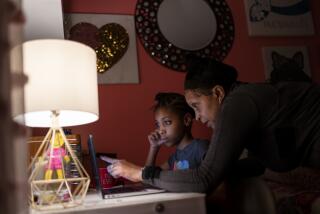JEFFERSON PARK : Middle School to Add On-Line Access
Officials at Foshay Middle School have decided to close the library, but for a good reason: to revamp it and install hardware necessary to come on-line with the Internet and other computer systems.
Foshay, which has lately garnered attention for a variety of reforms instituted by Principal Howard Lappin, will be renovating its aging main building. The project will include the installation of fiber-optics and computer technology that will provide the school access to the Internet, the global web of computer systems, as well as library systems and databases.
Foshay had already been slated for renovations to shore up the building, which dates to the 1920s, so Lappin took the opportunity to propose overhauling the library information system as well.
“Since they were going to be tearing out the walls anyway, it seemed like a good time to go ahead with installing the fiber-optics,” he said. “We have no place, no space on campus to build a new library or a new center. We have to work with what we already have.”
Renovations have begun on the third floor of the three-story building. Work will be expanded to the second level, which includes the library, next month.
“Libraries themselves are out of date; ours is totally inadequate,” said Lappin, motioning toward stacks of outdated books that will be given away to teachers and students who may want them.
“Teachers can take what they want, and students too,” said Librarian Bette Hosstetler, who is scheduled to leave Foshay for another campus in June. “The first couple of months without the library will be tough and transitional, but technology is a tool for kids to learn, and they need it.”
During construction, library books still useful will be spread among various classrooms.
Lappin has also secured a chartered bus to transport students to other libraries, such as the Los Angeles Public Library’s Jefferson Park branch, or at neighboring schools such as Bethune Middle School. The inconvenience will be “tough for our students in the short run, but great for them in the long run,” Lappin said.
To prepare students for the new information systems, Lappin said the campus will open a technology training academy in July. The academy will operate out of the campus’ Project Development Center, a computer-skills room that will also temporarily act as the school’s network server for the Internet, USC’s library and the many other databases accessible to Foshay.
The school-based management team, which consists of teachers, parents, students and administrators, recently decided to go ahead with plans to phase out the library after debating the effects of its absence on students and teachers. Lappin said that although some committee members were initially concerned about the loss, the consensus was that modernizing the library will ultimately prove beneficial to all.
Once a school with some of the lowest test scores in the district, Foshay has made a dramatic turnaround in the last six years under Lappin’s leadership.
A lightning rod for education reform in the inner city, it has attracted state and private grants and has become a pilot LEARN school, a reform effort that allows it to operate semiautonomously from the central district administration.
Foshay is also a prototype for the federally sponsored New American Schools Development Corp., a private nonprofit organization. As part of the program, Foshay launched a learning center last fall that gives students individualized attention and keeps them at the same campus from kindergarten through 12th grade.
Renee Bey, a parent of two Foshay students, said the arrival of the information technology is another progressive step for the school.
“What’s good about this is that it’ll keep the parents up-to-date. We get to be part of the expansion and growth too.”
More to Read
Sign up for Essential California
The most important California stories and recommendations in your inbox every morning.
You may occasionally receive promotional content from the Los Angeles Times.










